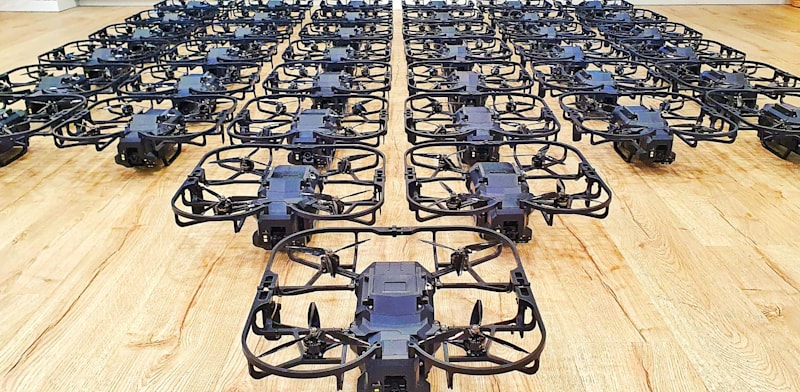Since the first weeks of President Donald Trump’s second term, when the president signaled a wholesale reimagining of the international trade system on a scale not seen in decades, mainstream economists have warned that prices would surge.
The mantra, repeated by everyone from mainstream economists to factions of the GOP, has been clear: A tariff is a tax on consumers. Businesses said the same, with three -quarters of importers in a recent New York Fed study declaring they planned to pass on some tariff costs to customers.
But halfway into the year and well into the most consequential reshuffling of trade in half a century, tariff-fueled inflation is missing in action.
The tariffs are certainly in place: The Treasury so far has collected a record-setting $100 billion in customs duties, and is on track to pull in $300 billion this year. The tariffs are paid by U.S. importers—think Walmart and other retailers—when goods cross the border into the U.S. It takes some time to work their way into the system, but eventually higher prices get passed onto consumers. Those higher prices directly influence the overall price levels in inflation measures.
Except there’s a mystery, wrapped in an enigma, and coated in a puzzle. One place tariffs aren’t showing up? In the inflation numbers.
For four months, official inflation readings from the Bureau of Labor Statistics have come in under expectations, with the latest inflation reading a relatively modest 2.4%. The president’s Council of Economic Advisers (CEA) this week released a brief arguing that import prices have actually been falling.
Why doesn’t the data show a tariff hit? Here’s what leading economists told Fortune.
It’s too soon
Though tariffs have been discussed for months, they haven’t actually been in place for that long.
“Regarding the impact of tariffs on prices, the timeframe used by the CEA is way too short to draw any definitive conclusions,” said the fiscally conservative National Taxpayers Union said in a critique on the study, which looked at prices through May. “Trump’s 10% nonreciprocal tariffs were only imposed in April.”
Tariffs on steel and aluminum went into effect in March and increased in June, while Chinese imports have been subject to a 30% tax since March; dozens more “reciprocal” tariffs, initially announced in early April, have now been postponed.
Meanwhile, official government price data takes time to collect and release. As of mid-July, the most recent data for the Consumer Price Index and Personal Consumption Expenditures deflator, covers May.
Big businesses are stockpiling
Immediately after tariffs were announced, importers rushed to bring in goods before they were subject to a higher rate. Businesses brought in so many goods, with no corresponding sales, that it briefly flipped the U.S.’ GDP into negative territory. (In economist math, imports count as a negative to GDP.)
That surge means that businesses could still be largely selling goods brought in under pre-tariff prices.
“Businesses stockpiled inventory, and presumably haven’t had to raise prices on goods because they’re sitting on the shelf. Eventually they will, and once they start to raise prices it’ll start impacting consumers,” said Eric Winograd, chief U.S. economist at AllianceBernstein, to explain this theory.
No one knows how much to raise prices
Uncertainty, in a word, is “the most important reason” the hard data doesn’t yet show tariff impact, according to Eugenio Aleman, chief economist at Raymond James.
“Business owners price their goods at replacement cost. If they have to buy the same good in the future, they have to increase the price [charged to the customer] if the price of the replacement is higher,” he told Fortune. The problem, though, is uncertainty. “Everybody knows the prices that firms will pay for replacement goods will be higher, but nobody knows by how much. That uncertainty is keeping many firms from repricing their goods.”
It’s coming out of profits instead
Businesses, particularly small businesses, could be choosing to eat the cost of tariffs for the time being. Unlike large businesses, they have a smaller client base and could be reluctant to hike prices, Aleman said.
“Maybe small firms are eating some large portion of the tariffs. Why? Because they can’t afford to lose clients,” he said. One potential data point indicating this possibility is recent Commerce Department figures showing growth in proprietors’ income—a proxy for small businesses—flatlining in May. Aleman stressed that more than one month of data would be needed to determine if this is the case.
Recent Bank of America research shows the amount of tariffs paid by small businesses in May nearly doubled from 2022 levels. “Small businesses may be, in some ways, more susceptible to tariff pressures than larger businesses, given their access to capital is more limited,” the note read.
They’re scared of Trump
An added factor is the bully pulpit of Truth Social, which Trump has wielded freely at even the largest retailer thinking of hiking costs.
“If the president sees significant pass-through of tariffs via prices, you’ll see a lot more public policy, probably via Twitter,” Jeff Klingelhofer, a managing director at Aristotle Pacific, told Fortune.
Customers won’t pay higher costs
Klingelhofer previously suggested that companies would take the brunt of the tariff impact because they’re the only ones who could afford to, with consumers being “tapped out” after years of high inflation. Former Federal Reserve economist Claudia Sahm also noted that companies today are less quick to hike prices now than they were during pandemic inflation, when Americans were flush with cash and eager to spend it.
In 2021 and 2022, “consumers up and down the income distribution, had some cash, and there were a lot of corporate earnings calls saying ‘We’re passing these [costs] through,’ and the consumer could kind of handle it,” she told Fortune.
Three years later, Americans have spent all the excess savings accumulated during Covid, and businesses “realize if they increase prices dramatically, they could be losing customers,” she said. “There is more hesitation. There is some raising of prices, but not the exuberance” of the pandemic.
Inflation might never come
That’s the position of Mark DiPlacido, policy advisor at American Compass, a conservative economic outfit that supports tariffs as a way to rebalance the U.S. economy.
“Foreign exporters have ended up absorbing a lot of [the costs], and businesses—very little has gotten to consumers at this point,” he said. Japanese carmakers, he noted, are slashing prices—sometimes nearly 20%—to compensate for the added costs U.S. buyers will pay. In other words, “Japan itself and Japanese companies are eating the costs of the tariffs.”
Every economist Fortune spoke with made some version of this point—that a tariff, rather than giving a blank check for a seller to boost prices, sets off a complicated negotiation between importers, exporters, and American end buyers. Finding the balance of which party pays how much will take time, and will be individual for each good and sector of the economy.
“Tariffs are a tax on imported goods,” Sahm said. “Nobody wants to pay the tax, so who is the weakest link? Walmart can go in and tell their Chinese producers, ‘You have to cut the price.’ Maybe in the pandemic the consumers said, ‘OK, I’ll pay it—I’m not really happy about it, but I have the money.”
The final answer, she added, “can be very specific to the business, the industry, and also the general macroeconomic conditions.”
























